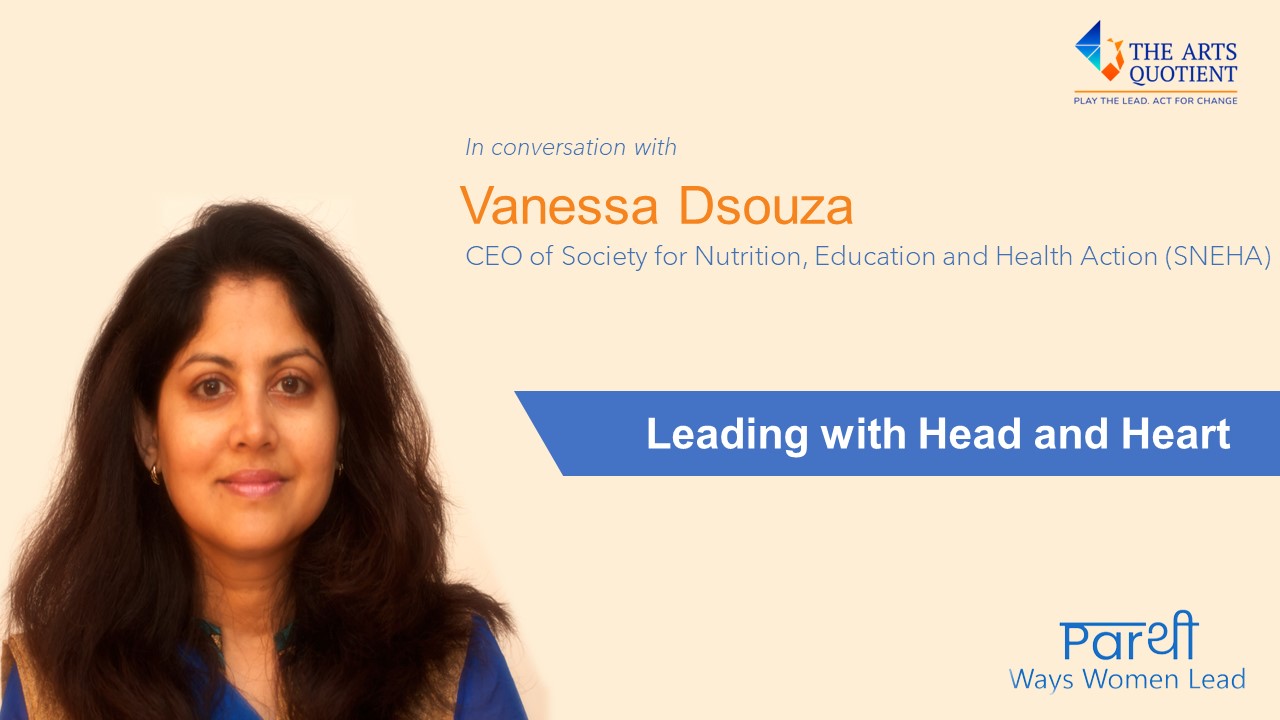SNEHA is a non-profit organisation that works with women, children, public health and safety systems. Their innovative work in urban informal settlements aims to reduce maternal and neonatal mortality and morbidity, child malnutrition and gender-based violence. Vanessa Dsouza has been leading this organization for 9+ years.
Exuding warmth, Vanessa talks about her journey transitioning from the corporate world to leading a not-for-profit organization, learning along the way and shares insights on being a woman at work.
Transitioning into the social sector

Vanessa’s foray into the social sector as a CEO of a non-profit was never part of her plan. Reaching a crossroads, she talks about how she found new purpose and developed a passion for her work at SNEHA.
“I worked with Citi for 21 years, I had absolutely no plans to move to the social sector. I actually decided to take a break. I call it the midlife crisis, when you know, you suddenly begin to rethink your life and what do you want to do with it. At that time, the founder of SNEHA, contacted me. I knew her on a personal level, socially and she said, we really need to fundraise.
So, I volunteered for SNEHA for two years, helping them fundraise helping them set up a small livelihood generation program. I think during that point in time, I began to understand the sector quite a lot. And through it about six or seven months after I started volunteering, the founders asked me to join full time, and I kept telling, I’m not a public health person, I’m not a doctor, I’m not a social worker, what the hell am I going to do in this sector?

And I think what really made a difference, was a trip into the community quite early in my volunteering days where I went into one of the day-care centres, and I was expecting a day-care centre with children would be you know, lots of life, kids running around and actually what I saw really shocked me. So, I saw these little children aged like two, three years old. Some of them could barely hold their heads up, forget about standing, running. They were thin, they were listless, absolutely, it was a pathetic state. I think that kind of disturbed me. So, I began to think, what am I doing? This was in Dharavi. I used to work in BKC before and I was thinking like, I'm three kilometres away. I have no idea that this is this was ever happening, right? So, you begin to get the sense of guilt. And then, you think, you know, what is it that I can do? And that's when I actually started getting more and more engaged still as a volunteer.
I honestly believe it is probably karma, or serendipity, or whatever you call it, but it definitely wasn't planned.
Then after about two years, the CEO of Sneha decided she wanted to take a break. And she requested me to do a temporary three-month, trial of the role. That’s how I got in, of course, now its nine years later but now I consider myself probably more of a social sector person than a corporate sector person. So that’s really how the transition happened.
A steep learning curve and bringing the whole brain to leadership
Moving into a leadership role laterally instead of growing with an organization, comes with its own challenges. Speaking from the heart (and head!), Vanessa describes her process of learning and finding acceptance as a leader at SNEHA.

“I think, I was actually very scared, because, SNEHA also had some very experienced and competent program directors. So, they were all masters and PhDs in their respective fields. For them to accept me as a rank outsider who has zero knowledge about the sector, zero experience, I would do maybe an initial meeting, but after that, the minute that conversation got deeper, I had to take someone with me. So, it was very scary. I think it was also difficult, because it was a very steep learning curve.
Most difficult was the cultural shift. I came from a hard-core left brained organization to this completely right brained organization, which was really hard. So, I think the adjustment to the high level of emotion, it took me a long time to realize that if the reason people are in this sector is because they are high on emotion, and it is part and parcel of the sector.
So, if you want to work here, you have to deal with people issues. And, I don’t think I’ve had as many people issues in the 21 years at Citi that I see here. And when I say people issues, it’s because people just have this high level of emotions so everything gets amplified. But I think it’s been a great learning.
When I joined, SNEHA had just launched three large programs. And within a period of, I think, maybe three to six months, they had increased the staff strength from 100, to 300. Actually, therein lay the opportunity, because they had scaled higher, but they had no systems in place. The existing program directors were domain people. So, they were somebody good at violence, or child health or nutrition or maternal health, but nobody knew how to run an organization.

Also, things like HR, finance, fundraising, communication, were all very ad hoc, they were not run by professionals, except for our finance person who was a CA, but everybody was just kind of, doing these small roles here and there, trying to pull things together. And also more importantly, listening, because the program teams were struggling, right? Suddenly, their teams had become huge, and they didn't know how to manage. So, what I did was, given that these were very experienced people, and I wasn't, I thought the smartest thing for me to do was just stay away from interfering with anything. Yeah, I would attend review meetings, donor meetings, etc, more to ask questions to learn, but not necessarily to check or to criticize or anything. And I found that very, very useful.
I concentrated more on finance and HR and fundraising and communication, etc. One is I could add a lot of value over there. In my last role, I was a private banker, fundraising came easily and I enjoyed it. Suddenly, there was money flowing into the organization, which, really helped, because it also helped us get additional resources – we needed more manpower in all these domain functions. I think the first six to 12 months of focusing on domain functions, including fundraising, also helped to build credibility…it was really important to establish credibility in those first six to nine months for me to then get accepted within the organization.
We had these, these five very strong leaders who had been with SNEHA for many years. I have to give them full marks, because it was very easy for five of them to just gang up against me and say, we don’t want her telling us what to do, or we don’t want her to be a leader. Because, after all, we’ve been in this organization for, 10-15 years. So, I think it was both ways, it worked from their side as well as from my side.
Gender at work
With a career spanning three decades across both the corporate and social sector, Vanessa discusses the changing experience of gender at work – over the years, and across sectors.
“I was in the corporate sector at a time when things like gender diversity, and paternity leave are not even words, forget about, actually being practiced, right? I still remember, I would only wear a sari or churidar. But today, everybody’s in trousers and everything has changed. I’ve actually been in in the corporate sector at a time when women were not accepted. I still remember in my last role in the private bank, I was the only woman in a 10-member team. And besides my regular role, when it came to additional responsibilities, I was doing service quality and why? Because, as a woman, I would be more sensitive to service issues. That may have been true. But you know, there was always this bias.
And when I've come to this sector (the social sector), forget about the fact that we work on gender diversity, but I've just seen women leaders much more vibrant, much more accepted in this sector.
“I think one, because we’re female dominated organization, sometimes we could be viewed by the male, by the men in the community as being, very pro women. But in reality, I don’t think we are pro women. So, for example, if you’re working on domestic violence, we do think it’s as important to listen to the man or whoever’s the member of that family as it is to listen to the woman. There are some challenges when you’re trying to engage a men’s group, because men’s groups prefer to listen to men and not to women. And I think those are some challenges that we do face from a gender perspective. The second is sometimes you will hire somebody and then the person comes in and says, in the final interview, I’m ‘expecting’, obviously, I’ll need maternity leave. I think as a woman, being a woman’s organization, we are more sensitive to a situation like this. We will not reject a woman because she’s expecting or if a woman has a health concern or even a man has a concern. We will actually support her to work on a health issue.

I'm not sure if that's a male or a female thing. But I think it's just that, because we're a health NGO, because we believe in women empowerment, that we've got to walk the talk. We can't be not giving opportunities to women. Honestly, in this sector, I have not really seen a male-female gender issue, in any kind of differentiation or any disadvantage, or on the contrary, I think there's an advantage because you understand the context more.
You also have an ability to deal with it better as a woman, you have an ability to understand another woman’s need to multitask, another woman’s need to be a caregiver at home. Therefore, you can be much more sensitive, about whether it’s maternity leave, whether it’s sick leave, whether it’s looking after a senior or their aging parent or whatever, you’re able to understand it better and able to be more sensitive. I think those are important, at the end of the day, most employees value an organization that treats them humanely, understands their personal challenges. So, but again, I’m not sure it’s a male, female, there are even men that are quite sensitive about these issues.

I remember when, when I had my baby, I had a really nice boss, who told me, I stayed quite close to the office, would say, every day at lunch break, why don't you go home and breastfeed your baby, because that time, there was only three months maternity leave. And obviously, it was difficult. I had another boss who said, “Listen, my wife doesn't work, if ever you have a maid problem, my wife can babysit.” So, there have also been very nice men, who have been very sensitive. So, I don't know if it's a gender thing, except that probably there are very much less men who would say that than women. In the corporate sector, many times, there would be a pushback because of gender. But, maybe role related, travel related, the typical thing, you're a woman you'll find it difficult to travel, you're a woman and how will you take on this increased responsibility, you have young children.
I used to always feel that women actually have this almost innate ability to multitask. You will make sure that you give enough time to family, but not necessarily at the cost of your job, you do it at the cost of yourself, right. But men don’t understand that, men tend to think that you will do it at the cost of your job, but I’ve seen women manage beautifully, multitask, do a damn good job at the workplace and also manage very well but obviously, they’ve given a lot more of themselves.

I think the best thing is actually more and more women being in the workplace. There are so many women friendly practices that never happened before, right? So, the concept of working part time, maternity leave, paternity leave, creche facilities all these things have come in because there are more women at work.
But for me, I think the greatest change is when women work, they make sure that their daughters also get equal opportunity. I know, in my own case, I never ever differentiate. It was never an option, that I should give more to my son, less to my daughter because she was as capable. She will as much need to be a bread earner, as my son. Similarly, I made my son do everything at home, run the machine, do the dishwasher, do everything because you better learn, you’re going to have a working wife, and you better learn how to do this, right? Because that’s the way your life is going to be. So, I think that’s the best thing that has happened, the environment is changed.
I look at my own friends, nobody is pushing their daughters to get married. I mean, a simple thing like everyone saying, ‘let them work, let them be on their feet.’ It's because they're all working women themselves, right? So, I think just having more women in the workplaces has made a big difference.
The second is also I think things have changed a lot for men. Earlier, I think if a man took a few days off, when his wife delivered a baby, it would be like, ‘Oh, my God, how could he take time off?’ But today, if he doesn’t take time off when his wife delivers a baby? You think ‘What kind of father is he? What kind of husband is he right?’ So yeah, the attitude of men is also changed. It’s, I think it’s happened to both sides. And it has to, right? At the end of the day, women need that enabling environment for them to be able to work.
Authenticity, perspective and transformation
Vanessa talks about the need to be authentic in leadership, especially when the work is transformational in nature. She describes how this works its way into on-ground choices as an individual and as a CEO.
When I came into the sector, it’s almost like a retirement career, right? So, I don’t have this driving ambition to be, this best-known CEO, to be in every public forum. I really want to do good work on the ground. When you feel that way, it translates into the way you interact with people, the way you give other people opportunities, the way you make decisions, because then you’re always making decisions anchored in the mission, anchored in the team. And I think that is very important.
In 2011-12, the NGO sector viewed the corporate sector with a lot of suspicion. And I was also viewed with a lot of suspicion, is she coming in with all these corporate ideas? Does she understand what it’s like to sit on the ground in somebody’s home in a slum? And honestly, it wasn’t easy. I had never walked deep into a slum. So, I think I was being watched. And again, I’m not the founder. So, I felt like a fish in a fishbowl. Yeah, I made mistakes. I mean, not that I didn’t, I made mistakes. I had to apologize for my mistakes, but that’s how you learn, right?
But I think authenticity for me to all these three: yourself, the team and the mission, really, that is the key; because people see through everything else. The fourth very important thing, which was a challenge for me is that it's a very participatory organization. And it takes much longer to do things. So, it does try your patience often.

But in the long run, I did learn that once if you take it slowly, if you take people's inputs in; one, you end up having a much better structured solution, because it incorporates everybody's inputs, and two, much better buy in and people then adopt and I think one thing about the sector is once they adopt, then they just run with it. I feel as senior leaders, that if we make wrong decisions, it impacts so many people, we can't afford it. And therefore we have to do what it takes to make sure that our well-being is intact. For example, last Wednesday, something happened in the morning that I was really irritated about and I was trying to calm myself down and tell myself okay because I had an 11 o'clock appraisal to do... annual appraisal and of a very good employee and I didn't want to go into that appraisal with a negative because as I started reading that that person's appraisal, I noticed myself only picking out what was not happening, rather than picking out all the good things that that person has done.
And then I thought this is really unfair to the person for me to take it out on him. So, I actually postponed the appraisal. Sometimes one has to do these sorts of things as a senior leader, because, eventually, I will only get that appraisal with him once a year. And if I say one wrong thing, I could end up demotivating someone for the entire year. So, we got to be very sensitive about what we say to people how we say it. I think corporate sector, leadership can be very transactional, right? And you come, you do a job and you go. Whereas, this sector is much more transformational that changes people’s lives. The first year I joined Sneha, we had this one donor who had come down from the US. He said, “I want to talk to your field workers.” And the question he asked them is, how has your life changed by working for SNEHA? And these were people who we hire from the slums, and they work over there. And they came up with the most amazing stories of change in their own personal lives. And then he told me he said, “My father actually grew up in a slum in Dharavi.” And their mother never spoke a word of English. And then they went off to the US and took these two sons when they were young. And then the sons got educated. And they of course, became multimillion IT tycoons. And then he decided then that he wanted to give back to India and to Dharavi. That’s how he came back.

But then I remember the first time he said all NGOs write about the stories of change they make of their beneficiaries, you need to write the stories of change you're making to your staff, okay, by doing the kind of work they do. And I thought that was so powerful, because that's really what Transformative Leadership is. You make change to the people who work with you, and then automatically they will make change in the communities they serve. So then, this whole focus of, we actually then cover about 60% of our staff and that time we were about 300 staff, we cover about 60% and got each one to say their story of change.
It begins to, in many ways humble you, right? Because you suddenly realize that, you may be the CEO, but you’ve not been so much transformation in your life, compared to what these people have made, right? So, it changes the whole way that you look at your staff, the way you make policies, like in this pandemic, we did not remove a single staff. Not only that, we were one of the few NGOs that gave a 10% increment in both years in 2020 and 21.
I remember fighting with my board, because they said, you don’t know if you have money. And I said, “Yes, I have built reserves, I’ve taken 10 years to build reserves. This is what a reserve is for.” And my boss said but that’s the family silver. I said, but today is the day to use your family’s silver, right? And, it was this, the staff valued it so much, because, of our current 500 staff, about 70% of them live in the slums, right? Their husbands lost jobs. So that 10% increment made such a big difference to their lives.
Building capability and scaling for impact
Vanessa discusses the impact of her leadership on SNEHA, winning greater visibility for the organization and her process of building leadership capability within. She talks about how having clarity about SNEHA’s objective has enabled them to advance without losing ground.
SNEHA was hardly known before. And again, it was a philosophical issue by the founding team. They said, ‘Oh, we’re in health NGO, we want to keep a low profile.’ And I remember when I was volunteering at that time and I was fundraising. And every meeting, I would go for people that heard of Aakansha, Pratham, maybe of a Muktangan but nobody had heard of SNEHA. And I kept saying that, if you want to raise money, people have to know about your work. And it can be the work you’re genuinely doing, you aren’t making up anything, but you need to go out.

So, I think one, today, creating that visibility for SNEHA is something that I have very actively worked on, which also meant that I had to go out, I had to speak a lot, I had to get my teams to go out and speak a lot about the organization. And in 2013, there was no social media, right? The only way you could get people to know is actually going out and speaking about your organization. In terms of the budget, when I joined Sneha, we had an annual budget of 5 crores today we have an annual budget of 36 crores. So, it's a huge growth and 36 crores of marquee donors, like the Gates Foundation, USAID, the McKenzie spot grant and Azim Premji.
The second is to actually deliver on what you want, and that’s where my program directors are very good, right? They’re really high-quality program directors. So, I think it’s really been teamwork. We’ve grown the organization we’ve grown it together.
We had these, just these five very strong leaders at SNEHA who had been with SNEHA for many years. And then below them, there was a group of mid-level people. But the gap was too big, right. And then we had one of the senior people who quit. And it became a real mess because I did not have the technical competence to take over that role. And that’s when I realized I have to have a full line of second in command leadership.
So, in 2015, I created that second in command leadership, and we call them associate program directors. And today, every program has at least two to three of these Associate Program Directors because what it’s done, it’s not only helped me to build a line of leadership for my program directors, but it’s built a large second level base, which is helped me expand so much and then then they’ve all grown over a period of time in their roles and their experience. Today, each Associate Program Director is handling a much larger portfolio than what my program director was handling earlier. So, we’ve automatically built the second layer.

The third is I think in terms of being very much ahead of the game on all our support functions, so whether it is technology, whether it's communication, it's fundraising constantly, whether it's HR systems. So that very, structured, systematic way of working, helps you also to scale. And, of course, our beneficiaries, I think when I joined, we must have been at 20,000 beneficiaries. Today, we're at 250,000 direct beneficiaries. The actual impact is much more. I think also, in many ways not getting swayed by external donor demands is something that I have believed very strongly in, and therefore, the kind of donors we have, I don't even call them donors, I call them partners, because I believe they're as invested in the work we do, as we are, and I have actually refused to donors on several occasions when I felt that we were not aligned on the same goal. And I think that's important, because the team also sees that, you're not willing to sell your soul just to get money, you believe strongly in something. And if it means saying no to a donor, you'd say no to a donor. So that is all quite important, because then people also begin to actually give of themselves also, because they're all then on the same mission.
I learned again, through my own mistake. I think mistakes teach you the most in life, right? We actually got a donor who wanted us to focus on livelihood generation, like livelihood generation was a very small component of our work. And they also wanted to give us money, because they like the work that we do. But she said our focus is skilling. So, what you do is in when you write your proposal, you write out saying more, you’re doing Skilling and then as the in order to skill the adolescents, you’re also doing health, which was actually the reverse, right?
Six months after we got the grant, I realized that we were spending all our time doing skilling. And that was not our core work, we did not have the competencies for it, we didn’t have the mind-set for it. And that’s when I learned that it is better to tell the donor that “Listen, I am not aligned, we’re not aligned”. So, we do have that clarity at SNEHA.
I feel that reaching people is not enough, you have to actually make a change in that person's life. So that person should actually in any way, maybe that person should have a better education should have better health, maybe have better decision making, etc. You can't change the world, but at least the lives that you do change, you can change the world for them.
I actually have a very, very, very mixed feeling of the word scale, because I see many organizations scaling large as in touching large, or they claim to, reach out to million people, reach out to 2 million people. But I feel that reaching people is not enough, you have to actually make a change in that person’s life. So that person should actually in any way, maybe that person should have a better education should have better health, maybe have better decision making, etc. You can’t change the world, but at least the lives that you do change, you can change the world for them. So, I think that’s the kind of legacy I would like to leave behind.
Advice to women aspiring to leadership roles
- Be very clear about you want, what your vision is and what you want to achieve. Be very determined. There are lots of challenges. The easy thing is to throw in the towel, the difficult thing is to constantly figure out how you will solve a problem.
- Have humility and listen. I think there is wealth of knowledge and experience out there. You don’t have to do everything yourself. But if you can listen, if you can learn from others, there is so much to benefit from that. Seek help. We try to do it all, because we think we can do it all. And I think that’s a big mistake.
- Don’t be afraid to make mistakes. We learn much, much more in life from our mistakes than we learn otherwise. You have experiences, and then your frame of reference widens, and you just become a little wiser and better informed. But you pivot when you have some crisis. When you have a problem, don’t try and manage everything yourself; escalate it, never try and hide it.
- So, if you want people to have your back, they have to trust you, that comes with relationships. I mean you’d stand up for someone whom you believe in. I think this constant thing of building relationships and nurturing people will automatically get you buy in because then people will value you ultimately, people have to value you as a person.
- I believe because you’re trying to multitask and do these multiple roles, self-care in whatever way is important. For example, for me, I just have to have some form of exercise every day. It just kind of de-stresses me. So, no matter what I make sure that I get like a half an hour, either of a treadmill, or an hour of yoga early in the morning or something.
As my coach always says that a stressed person makes bad decisions. And I keep telling my team that, that, you know, we have to be responsible for our own mental well-being because the minute we don’t have mental well-being we will make wrong decisions. And, especially because we are all women, we people are multitasking. So I feel that’s extremely important as a woman if you want to do everything.
